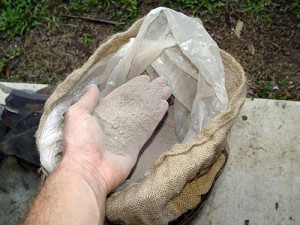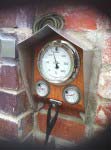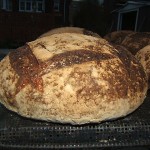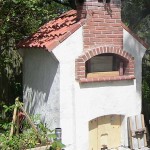Category: main menu • fire clay menu • Pennyweights
fire clay conversion
Amount: 1 pennyweight (dwt) of mass
Equals: 1,193.53 cubic millimeters (mm3) in volume
Converting pennyweight to cubic millimeters value in the fire clay units scale.
TOGGLE : from cubic millimeters into pennyweights in the other way around.
CONVERT : between other fire clay measuring units - complete list.
Conversion calculator for webmasters.
Fire clay mass vs. volume
Powdered in dry-loose form (not packed) fireclay, or fire clay, as it comes out from a purchased bag, has quite a high mass of 1303 grams per 1000 cc - cm3 - 1 liter - 61.024 cubic inches, 61 cu in rounded. This makes it 1.303g/cm3 or 0.753oz/cu-in density.

That is for how heavy a raw fire clay is. No wonder the bags feel so excruciatingly heavy.
For more comprehensive information on fire clay, and its uses in heat resistant applications, see the what is fire clay. The page also talks about how and where to obtain the right fire clay from the nature (if needed to sell it or how to go about making inexpensive raw clay adobe tiles and mud ovens out if it.)
Convert fire clay measuring units between pennyweight (dwt) and cubic millimeters (mm3) but in the other reverse direction from cubic millimeters into pennyweights.
| conversion result for fire clay: | |||||
| From | Symbol | Equals | Result | To | Symbol |
| 1 pennyweight | dwt | = | 1,193.53 | cubic millimeters | mm3 |
Converter type: fire clay measurements
This online fire clay from dwt into mm3 converter is a handy tool not just for certified or experienced professionals.
First unit: pennyweight (dwt) is used for measuring mass.
Second: cubic millimeter (mm3) is unit of volume.
fire clay per 1,193.53 mm3 is equivalent to 1 what?
The cubic millimeters amount 1,193.53 mm3 converts into 1 dwt, one pennyweight. It is the EQUAL fire clay mass value of 1 pennyweight but in the cubic millimeters volume unit alternative.
How to convert 2 pennyweights (dwt) of fire clay into cubic millimeters (mm3)? Is there a calculation formula?
First divide the two units variables. Then multiply the result by 2 - for example:
1193.5332617038 * 2 (or divide it by / 0.5)
QUESTION:
1 dwt of fire clay = ? mm3
ANSWER:
1 dwt = 1,193.53 mm3 of fire clay
Other applications for fire clay units calculator ...
With the above mentioned two-units calculating service it provides, this fire clay converter proved to be useful also as an online tool for:
1. practicing pennyweights and cubic millimeters of fire clay ( dwt vs. mm3 ) measuring values exchange.
2. fire clay amounts conversion factors - between numerous unit pairs.
3. working with - how heavy is fire clay - values and properties.
International unit symbols for these two fire clay measurements are:
Abbreviation or prefix ( abbr. short brevis ), unit symbol, for pennyweight is:
dwt
Abbreviation or prefix ( abbr. ) brevis - short unit symbol for cubic millimeter is:
mm3
One pennyweight of fire clay converted to cubic millimeter equals to 1,193.53 mm3
How many cubic millimeters of fire clay are in 1 pennyweight? The answer is: The change of 1 dwt ( pennyweight ) unit of fire clay measure equals = to 1,193.53 mm3 ( cubic millimeter ) as the equivalent measure for the same fire clay type.
In principle with any measuring task, switched on professional people always ensure, and their success depends on, they get the most precise conversion results everywhere and every-time. Not only whenever possible, it's always so. Often having only a good idea ( or more ideas ) might not be perfect nor good enough solution. If there is an exact known measure in dwt - pennyweights for fire clay amount, the rule is that the pennyweight number gets converted into mm3 - cubic millimeters or any other fire clay unit absolutely exactly.
Oven info & galleries
- Home Page
- Oven building CDrom details
- Pizza ovens
- New gallery
- Oven meals
- Vintage forum
- Rectangle shape vs. round igloo
- Building details
- Refractory concrete
- Heat resistant mortar
- Concrete cladding layer
- Thermal insulation
- Fire-bricks
- Fire-clay
- Saving money & time
- Good thermometer
- Oven building 1
- Building oven 2


